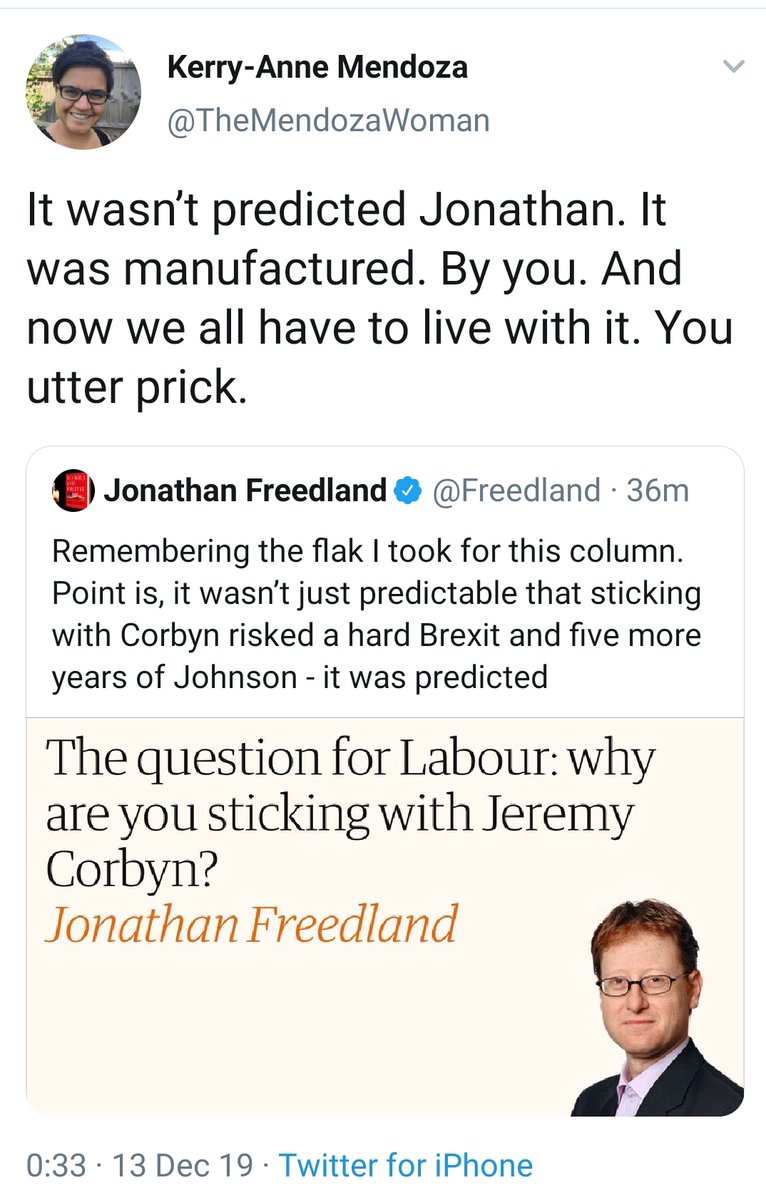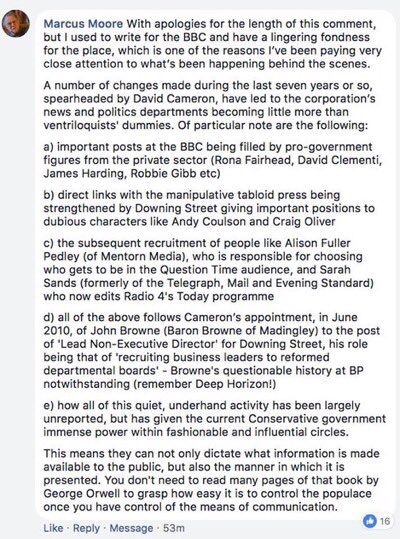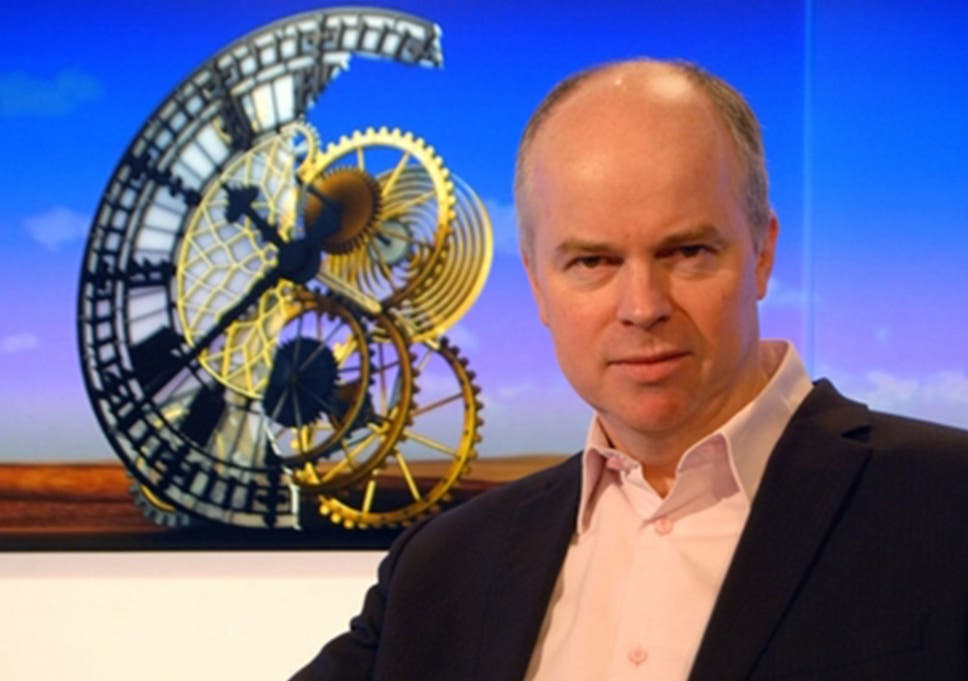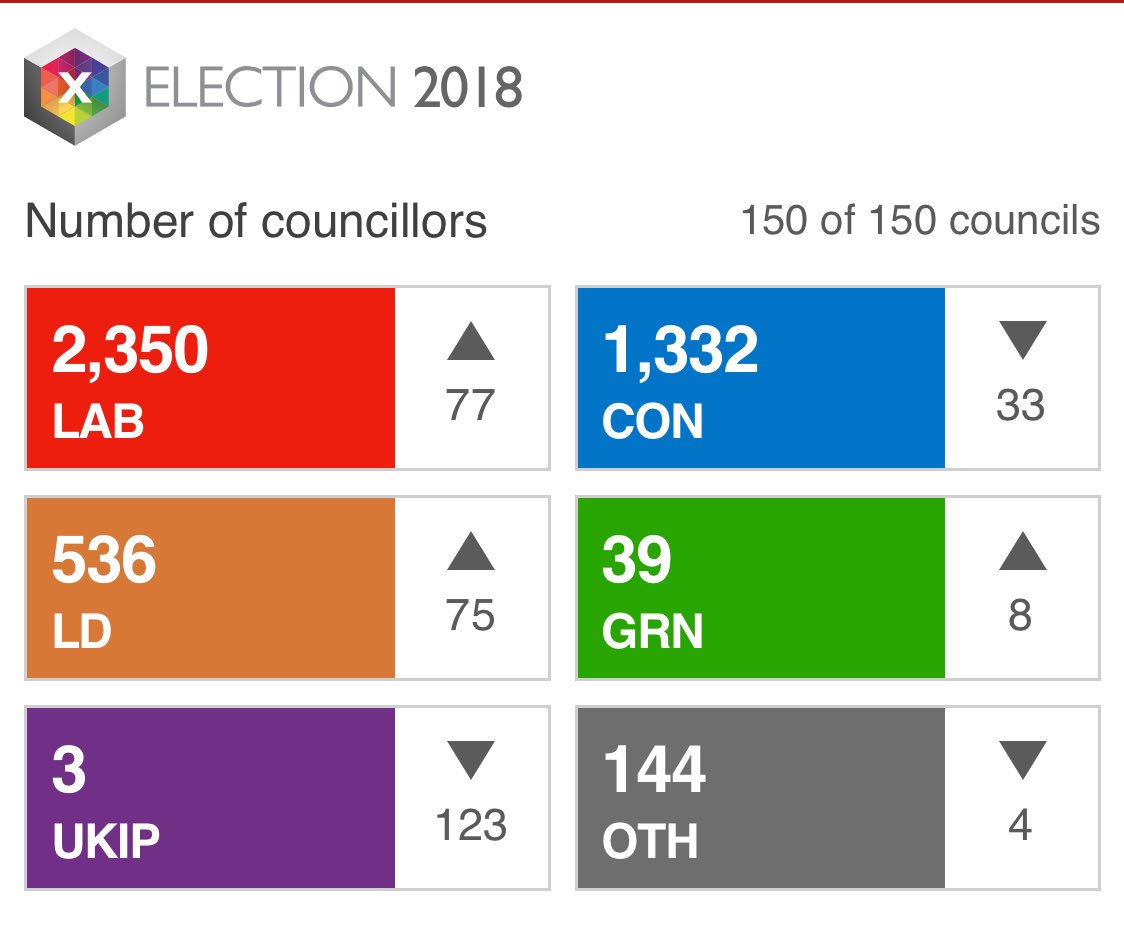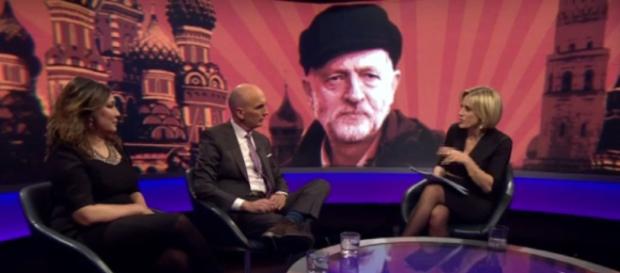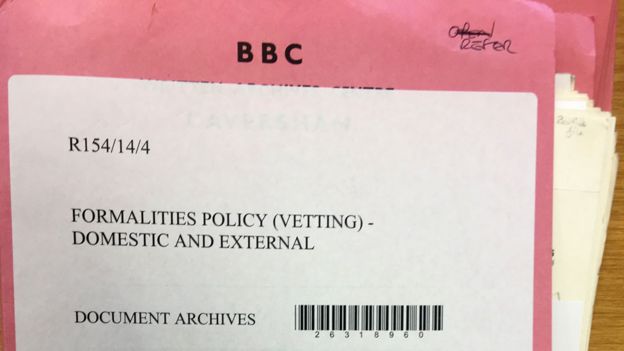Disinformation and propaganda can take many forms—from the use of false images, misleading headlines, to social media techniques that create an impression of consensus – that the ‘majority’ understands an issue in a certain way (also called ‘bandwaggon technique’). Polling can be misused, for example, to create an illusion of agreement in a population, and to draw on the conformity tendency or ‘herd mentality’ of the public.
Media agenda setting and framing of events may also contribute to the bandwaggon effect, and even subtle cues such as a broadcast presenter’s attitude and language towards election candidates can also influence voters.
For example, the many times we have heard the phrase “… let Jeremy Corbyn in” from broadcast media over the course of this election sends out a message that a Labour government would not be the norm, or the ‘preferred’ outcome of an election. The phrase also references and amplifies Theresa May’s chilling authoritarian comment that the Tories would “never allow [Jeremy Corbyn to be elected as Prime Minister] that to happen”. That is the intended subtext.
Sometimes, journalists quite openly reveal their own clear biases. This blatant lack of impartiality contravenes the UK’s norms of democracy and dismally fails to uphold public interest.
The comments, attitudes, gestures and facial expressions of presenters may also send out cues about party leaders deemed ‘suitability’ for office. Boris Johnson’s avoidance of difficult interviews was not because of cowardice. It was a tactical measure to avoid scrutiny, and to avoid being seen in a negative light. The interviews he did participate in were friendlier than other party leaders. Johnson had an easier time of it, by and large, during the election campaign.

Johnson was somehow unable to find time to be interviewed by BBC1’s Conservative but nonetheless formidable Andrew Neil. He had no problem squeezing in a breezy and fawning chat with Phillip Schofield and Holly Willoughby on ITV.
Can’t imagine why. Informative to see what ‘rigorous scrutiny’ from the British media looks like, however.
The media’s complicity in a strategic disinformation campaign

The case of Jack Williment-Barr, the four-year-old boy (pictured above) who was forced to sleep on a hospital floor as he waited in A&E, has brought public focus on the state of the chronically underfunded NHS just days before the election. The story appeared in the Daily Mirror. But it has also put focus on the other key trend of the election campaign: false and misleading claims that have circulated on social media and been amplified significantly by the mainstream press.
The image of Jack lying on a pile of coats has been at the centre of two major controversial disinformation campaigns. Jack’s story and the shocking image that highlighted the shocking state of the NHS have now been subjected to dishonest political re-edits, twice over. It is inconceivable that these re-edits have originated from anywhere other than the Conservative headquarters.
First, journalists who claimed to have been briefed by ‘senior Conservatives’ misreported that Matt Hancock’s adviser had been punched by one of 100 activists who arrived after the health secretary came to the hospital in an attempt to deal with the ongoing story. It turned out that there was no such punch, and that the adviser had simply accidently walked into the hand of one of the very small number of protesters who were at the hospital. He was pointing at something.
Hancock visited the hospital as a ‘damage management’ exercise following Boris Johnson’s earlier refusal to look at a photo of Jack on the floor of the hospital presented to him by Joe Pike, an ITV journalist. He took the phone from Pike, to avoid a difficult discussion about the government’s chronic underfunding of the NHS.
In the second re-edit, thousands of people shared a story that claimed to prove the photo of Jack was ‘staged’ by ‘Labour activists’, and that his mother had placed him on the floor specifically to take a photo. Once again, the claim was false; once again, it was amplified across social media by key journalists and political editors before any of them had bothered checking the provenance of the claim, or the facts of the case from the hospital itself.
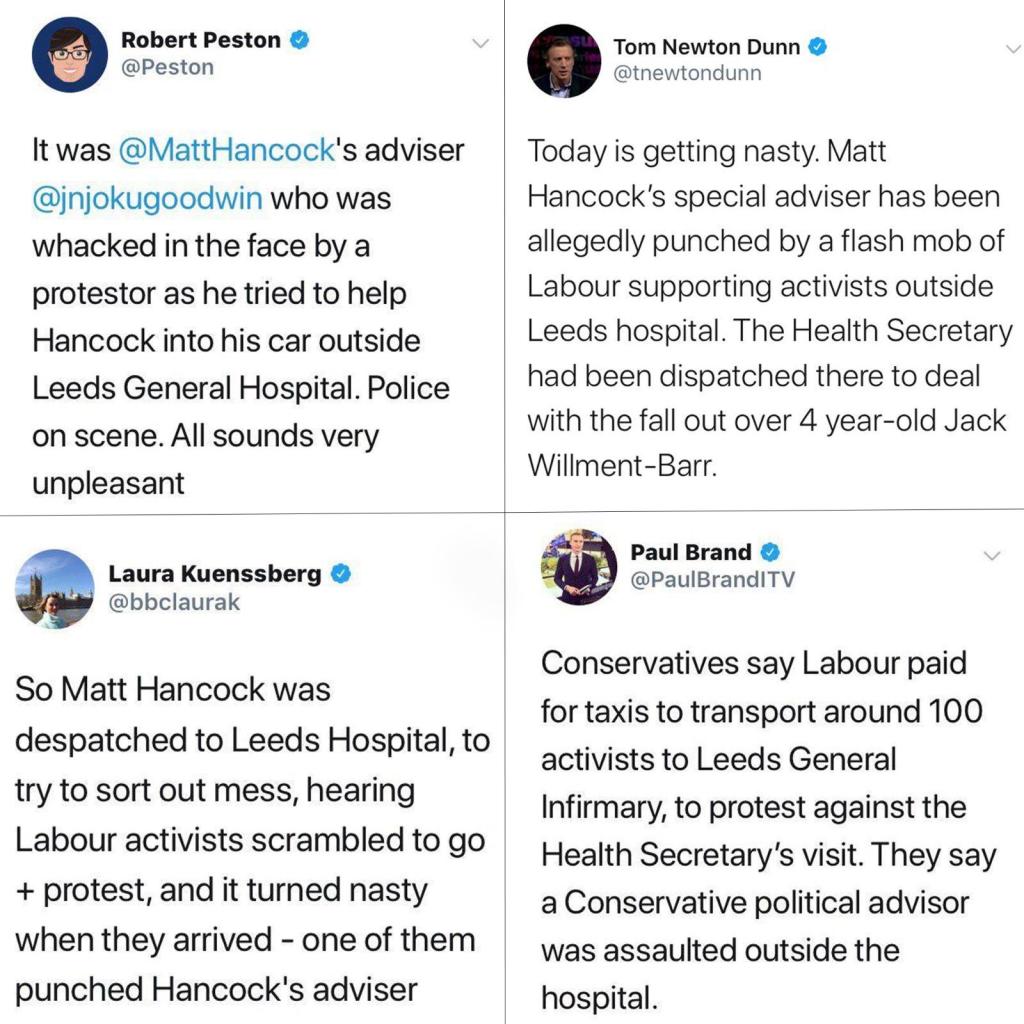
So Hancock was sent to Leeds General Infirmary, where the original photograph was taken. “Health Secretary has been despatched to Leeds to try to sort this out after PM’s awkward reaction earlier,” the BBC’s Laura Kuenssberg tweeted.
Soon after he arrived, reports came from many of the country’s leading political journalists that Hancock’s aide had been attacked. Reports including ITV political editor Robert Peston, Laura Kuenssberg and others. This certainly looked like a very well co-ordinated disinformation campaign.
There were also reports that claimed “100 activists” had arrived and that their journey had been “paid for by the Labour Party.”
Some indicated that they had been told the news by Conservatives, and later indicated that the claims had been checked with “multiple sources.”
That will be just Matt Hancock, then.
It very quickly became clear that all of those claims were false. A video of the incident appeared shortly after that made very clear that there were only a few activists, and that the punch had not actually happened at all.
Then, the same evening, the second misleading narrative took hold. A flurry of tweets began, boosting two stories that were eerily written using the same wording.
The first and most prominent disinformation item claimed to be sourced from a senior nurse who worked at the hospital, though it got the name of it wrong. It said that the photo had been staged by Jack’s mother, and that he immediately got back on a trolley after it was taken.
The second, which appeared to start slightly later, was credited to a “paediatric nurse.” It used a range of seeming medical jargon to definitively suggest that “no child would be treated in such a way,” and that therefore the image was either fake or misleading.
In both cases, a flurry of accounts took the text of the tweet and re-shared it, oddly, as if it was their own comment. It also made its way onto Twitter, where it was similarly shared without context.

Taken together, the story was shared tens of thousands of times onto different social media sites. Many have suggested that bots have been used.
The original viral post on a medical secretary’s Facebook account said, “I am a nurse myself” and cited a “good friend of mine” at Leeds General. It claimed the boy in the photo “was in fact put there by his mother who then took photos on her mobile phone and then uploaded it to media outlets”. The post dismissed the pictures of the ill boy as “another Momentum propaganda story”, despite the fact the hospital had already apologised for his treatment.
She later claimed her account had been hacked.
It didn’t matter that the hospital had confirmed the incident happened and apologised to the family, or that the nurses who supposedly served as the source for either story were anonymous and almost certainly not real. The story was shared as if it was fact and was amplified by Conservative MPs and senior journalists.
In some cases, those people have taken down those tweets. But worryingly, others are still live, and still being interacted with by readers.
Neither of the claims are remotely factual. Again, the hospital involved has confirmed that the incident happened, and that the event the photograph shows is real.
Responsible and publicly trusted reporters, such as Kuenssberg and Peston have a fundamental duty to make sure the comments they are putting out in the public domain have been verified and fact checked.
The hospital statement had already summed it the situation up – the hospital admitted there was no bed, the expectations of the family fell woefully short of the high standards of the NHS and as such an apology was issued.
The standards of journalism fell woefully short of the high expectations of the UK media. Throughout the election campaign, it’s clearly evident that the mainstream media has demonstrated that we cannot trust it to deliver impartial commentaries or fact checked news.
However, the BBC did address the despicable misinformation campaign, but not during peak viewing hours:
Laura Kuenssberg’s controversial, possibly illegal comments on the postal vote
Laura Kuenssberg: “the postal votes, of course, have already arrived. The parties, they’re not meant to look at them, but they do kind of get a hint. And, on both sides, people are telling me that the postal votes that are in are looking very grim for Labour…”.
The Electoral Commission says: 1.9 Ballot papers will be kept face down throughout a postal vote opening session. Anyone attending an opening session must not attempt to see how individual ballot papers have been marked. It follows therefore that keeping a tally of how ballot papers have been marked is not allowed.
1.10 In addition, anyone attending a postal vote opening must not attempt to look at identifying marks or numbers on ballot papers, disclose how any particular ballot paper has been marked or pass on any such information gained from the session. Anyone found guilty of breaching these requirements can face an unlimited fine, or may be imprisoned for up to six months.”
In a statement on Twitter, the watchdog said: ‘It may be an offence to communicate any information obtained at postal vote opening sessions, including about votes cast, before a poll has closed. ‘Anyone with information to suggest this has happened should report it immediately to the police.’
Kuenssberg told viewers on Wednesday – with just hours to go before the polling stations opened – that while parties were not supposed to look at voting papers when they were verified – but not counted – at opening sessions, they did “get a hint” of how they were doing and it was not looking good for Labour.
Her comments, however, came across as a statement of fact, rather than a hint.
She said: “The forecast is that it’s going to be wet and cold tomorrow. The postal votes, of course, have already arrived. The parties – they’re not meant to look at it, but they do kind of get a hint – and on both sides people are telling me that the postal votes that are in are looking pretty grim for Labour in a lot of parts of the country.
“Of course, postal voters tend to skew to elderly voters and people who vote early … but the kind of younger generation who we know skew much more to the Labour party, you might expect to turn out to the polls tomorrow. But in this winter election, turnout is just another one of these factors that we just can’t predict.”
Kuenssberg’s remarks, made during an interview on the BBC’s Politics Live programme, was widely shared on social media on the final day of an election campaign that has seen unprecedented criticism of the media. It led to suggestions that she could potentially have breached the Representation of the People Act, which prevents the reporting of how people voted until after polls close.
A spokesperson for the broadcaster made clear they did not believe there were any issues with the on-air comments. “The BBC does not believe it, or its political editor, has breached electoral law,” they said.
Ballot papers are kept face down while votes are opened and it is forbidden to attempt to see how ballots have been marked or to keep a count. Postal votes are not counted until 10pm on the day of the election.
The broadcasting regulator Ofcom has strict electoral rules around broadcasting or publishing the results of votes or opinion polls on election day before 10pm over concerns that doing so could influence voters’ decisions.
Meanwhile, the Guardian reports that Waltham Forest council in east London has been scrambling to deliver postal votes that should have been out by last Friday, after an administrative error delayed the process.
The problem affected 1,470 voters in three constituencies, including Chingford and Woodford Green, which Iain Duncan Smith won for the Conservatives with a majority of 2,438 at the last election and which is a key target for Labour.
The council could not say how many voters were affected in each constituency but said all but one form had now been delivered.
It said 1,364 forms had been hand-delivered by the end of Monday and 105 more had been couriered to voters outside London on Tuesday and Wednesday.
A council spokesman said the borough had dealt with 27,993 postal votes for this election. He apologised for the error and said the Electoral Commission had been notified.
He added: “Completed postal votes will get to us if they are posted by last post on Wednesday 11 December. They can also be handed to staff at any polling station in the constituency on the day of the general election.”
Given the context of this error, it’s very easy to see why many people have a growing concern that this election may be rigged.
The fake narratives and lies in the Conservatives’ and Liberal democrats’ social media campaigns
Almost all of the Conservative Party’s recent Facebook adverts promote claims labelled as misleading or untrue by one of the platform’s third-party fact-checking partners, a First Draft investigation has found.
Nearly 90% of the ads posted in the first days of December push figures already challenged by Full Fact, the UK’s leading fact-checking organisation. The non-partisan, independent charity works with the tech giant to assess posts which have been reported as misleading or false by users in the UK.
Facebook recently announced that posts from political organisations and political adverts are exempt from fact-checking, meaning parties and candidates can promote inaccurate claims without scrutiny.
Online ads have become a controversial central theme of elections, where parties can reach voters with micro-targeted messages that are ‘psychographically tailored’ according to the data held on individuals, concerning their postcode, hobbies, site and online buying preferences and other private information collected by data analysts, but these categories are not in public view in the Ad Library. (See: The government hired several murky companies plying the same methods as Cambridge Analytica in their election campaign.)
The so-called “dark ads” have emerged as a method of advertising that utilises data obtained by the likes of Facebook and Google, among other platforms to ‘customise’ and tailor messages in political campaigns.
They can be served directly to users of Facebook and via Google’s widely used double-click technology which serves ads to millions of websites, including political ads.
It should not be left to US internet companies to safeguard UK elections. Our election laws are decades out of date, and our next Parliament should take urgent steps to secure the accountability and transparency we need to protect our democracy.
Will Moy, chief executive of Full Fact, told First Draft: “Full Fact plays an independent role in Facebook’s Third Party Fact Checking programme, which doesn’t currently cover ads or content from political figures or parties.
“But Full Fact continues to regularly scrutinise claims by all political parties, including manifestos and debates during this election campaign.”
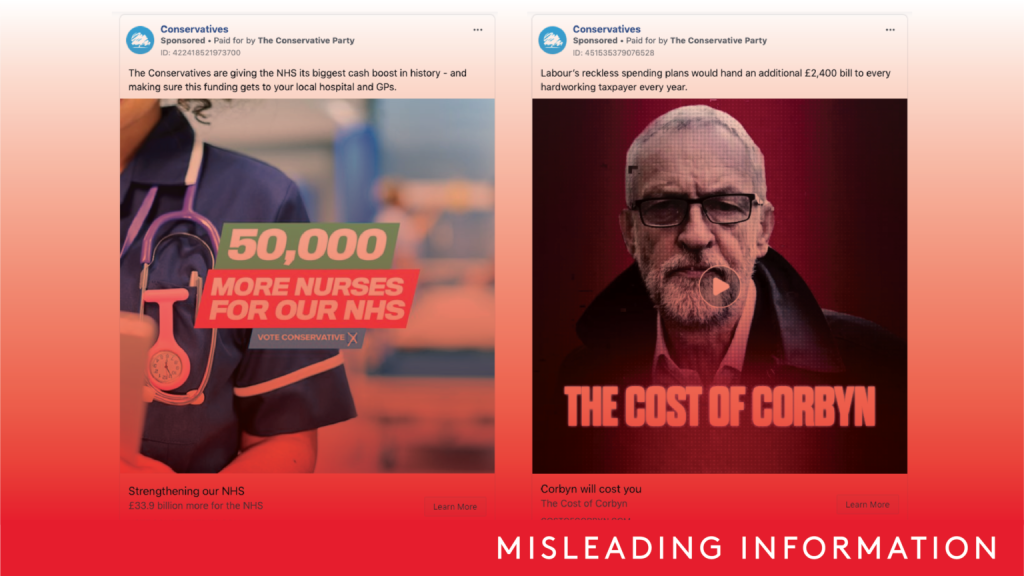
The Conservatives massively stepped up their ad campaign on Facebook, running almost 7,000 ads and spending more than £50,000 between November 27 and December 3, according to the latest figures from Facebook’s Ad Library.
First Draft accessed the Facebook Ad Library API to download all 6,749 ads from the Conservative Party between December 1 and December 4. Some 88% (5,952) of the most widely promoted ads featured claims about the NHS, income tax cuts, and the Labour Party which had already been labelled misleading or untrue by Full Fact.
Not every ad includes the misleading claim directly in its image or caption. At least 54% (3,646) of the total ads served link to a webpage carrying the misleading claims.
When ITV News asked senior Conservative Michael Gove about the ads, he said: “I’m not aware of any adverts that we publish that have been misleading.”
The central Conservative Party press office have not responded to requests for comment.
A Facebook spokesperson told ITV News: “We don’t believe a private company like Facebook should censor politicians. Our approach is instead to introduce unprecedented levels of transparency so anyone can see every political advert and who it’s from.”
The misleading ads include:
- A total of 5,132 ads push the claim that the Conservatives will build “40 new hospitals”, either in the caption, image or link. The claim was labelled as misleading by Full Fact on October 3, before the election started, which showed Boris Johnson’s government had actually announced plans to build six hospitals, not 40. A separate Full Fact article addressed the same claim in the Conservative manifesto but found the pledge had not been costed and would not be fully delivered in the forthcoming parliamentary session.
- The claim that the Conservatives will create jobs for 50,000 more nurses was amplified by more than 544 ads. This claim has been widely criticised as including almost 20,000 nurses already counted in official figures. Full Fact questioned how the nurses would be costed and reported the manifesto “doesn’t say when it aims to deliver this by or whether they’ll all be full-time.”
- The claim that the NHS will receive an extra £34 billion — described as “the biggest increase in a generation” and “the biggest cash boost in history” — featured in the link of two ads posted more than 1,705 times. It was also addressed by Full Fact, which stated: “if we account for inflation—the meaningful way to look at spending over time—the last time there was a larger spending increase on health in England was between 2004/05 and 2009/10.”
- The claim that “Jeremy Corbyn as Prime Minister would mean £1.2 trillion in reckless spending that would hand an extra £2,400 tax bill to every hardworking taxpayer each year” is pushed 4,028 times within different ads. The figure was already marked as misleading as “the calculations and assumptions behind it have a number of flaws”, said Full Fact.
- Finally, we found 219 ads containing the claim that many people saved £1,205 a year on income tax since 2010 thanks to a tax cut. Full Fact showed in 2018 that this number doesn’t account for inflation, and that “the figure drops to £940 once that’s factored in.”
Moy, director of Full Fact, said: “This election candidates and campaigns on all sides are asking voters for their trust. Serious parties and politicians should not be recycling debunked claims or targeting individuals with bad information – we all deserve better than that.”
Facebook, however, expects that the public will somehow determine for themselves the truth of claims made in adverts. It’s a view that is evidently shared by the BBC regarding claims made in party manifestos.
The Liberal Democrats have also been accused of misleading voters ahead of polling day, using inaccurate graphs and leaflets masquerading as local newspapers, which featured in their posted leaflets.
The Lib Dems have also been accused of using misleading graphs in Facebook ads. First Draft found hundreds of Lib Dem Facebook ads use graphs to falsely claim they are the only party to beat Labour, the Conservatives or the SNP “in seats like yours”.
Facebook does not provide data on where the ads have been targeted but some Twitter users have complained that they have received ads which reflect voting pattern statistics that are inaccurate for their constituency.
At least 16.5% of the Lib Dems 7,295 ads since the campaign began feature such claims.
First Draft has not been able to find misleading claims in Facebook adverts from the Labour Party, which has promoted far fewer ads than the Conservatives or Liberal Democrats.
However, Full Fact recently described as “not credible” one claim that the average family would save £6,700 under Labour policies. Labour’s Liz McInnes has used this claim in a Facebook ad.
Fact Check say: “More than three quarters of the supposed “savings” come from just two large costs, rail season tickets and childcare, neither of which comes close to reflecting what an average family actually pays. In England, two fifths of families don’t pay anything for childcare; only 5% of people use a train more than three times a week.
However: “Some of the smaller figures seem fair estimates of savings that might come about if Labour’s policies were implemented, but they overstate the extra costs families have faced since 2010.”
And: “We haven’t seen the workings behind this figure, which Labour says is from a House of Commons Library analysis.”
There’s a world of difference between contested figures and deliberate intent to mislead the public, as the Conservatives and Liberal Democrats have set out to do.
The Tories’ ambition is a one party state
The Tories have been brazen in their contempt for democratic process and norms. For example, it has been plain from their increasing reliance on statutory instruments (SI) to sidestep debate and voting in the Commons, in order to push through controversial and unpopular draconian policies.
When the House of Lords overturned Osborne’s nasty raid on the working poor’s tax credits (itself enacted by statutory instrument, in case the Commons vote it down), he reacted with the oblique but unmistakable threat to flood the Lords with so many new Tory peers so that such a defiance of his authority could not be repeated.
The Conservatives’ utter contempt for both international and national human rights legislative frameworks is another worrying symptom of authoritarianism. The UK is the first state to have prompted investigation into how it upholds the human rights of disabled people. The inquiry report concluded that the government have systematically and gravely violated the human rights of disabled people via their punitive policies. The government continue to deny this, and in the meantime, the public has tended to look the other way while ill and disabled people die prematurely through neglect, loss of support and other austerity related cuts that were disproportionately targeted at one of the most vulnerable communities.
The way in which the Tories have treated marginalised communities has expressed clearly their traditional prejudices, leading to direct discrimination and oppressive policies, while those with the least need – the millionaires – have been lavished with tax cuts and other hand outs from our public funds.
The highly controversial welfare ‘reforms’ were hammered through the scrutiny stage into legislative process by Cameron’s claim to an archaic Commons proviso: ‘financial privilege’. The public are still waiting to see the risk register following the Health and Social Care bill, despite the government being ordered to place it in the public domain by the Information Commissioner and the court.
Then there was Johnson’s illegal prorogation of Parliament- normally a standard procedure in the calendar of Parliament, but the prerogative was clearly used for controversial political objectives by the PM.
The prorogation was an improper and unlawful attempt to evade parliamentary scrutiny of Johnson’s Brexit plans in advance of the UK’s departure from the European Union on 31 October 2019; individuals and groups who opposed the prorogation included opposition MPs, UK constitutional law scholars, and John Major, the former Conservative Prime Minister. The Speaker of the House of Commons, John Bercow, called the decision a “constitutional outrage”.
Page 48 of the Conservative manifesto
Stefan Enchelmaier, Professor of European Law at the University of Oxford, “almost missed” the mention of the Human Rights Act (HRA) in the Conservative manifesto. Probably, most people have. That is probably the point.
Buried on page 48, the 2019 manifesto contains a single mention of the party’s pledge to “update” the 1998 HRA, which brings the European Convention on Human Rights (ECHR) into domestic law. It doesn’t specify what the ‘update’ will look like, or when it will happen (beyond “after Brexit,” which isn’t much of a clue). The language is euphemistic and vague, indicating that the ‘update’ will “ensure that there is a proper balance between the rights of individuals, our vital national security and effective government.” This is not a pledge intended to draw attention.
The attempt at hiding this pledge marks a change. David Cameron’s 2015 manifesto, which also promised the infamous “in-out referendum,” committed—five times over; three in bold—to “scrap” the Human Rights Act (HRA) and introduce a British Bill of fRights. This pledge came despite the failure of the 2010 coalition’s especially set-up Bill of Rights Commission to agree on its content, and by the end of 2015, there was still no British Bill of Rights. In December 2016, it was announced that HRA repeal was delayed until after Brexit; and the 2017 Tory manifesto pledged to remain signed up to the ECHR “for the duration of this parliament.” For now, that is.
During this time, some prominent Conservatives politicised the HRA as “Labour’s.” Others, such as Dominic Grieve defended it.
This is a bit strange given it passed with overwhelming cross-party support in 1998.
Furthermore, the ECHR itself was shaped to a considerable degree by Winston Churchill and Tory lawyer David Maxwell-Fyfe . More recently, the Conservatives have used a narrative of the legal sovereignty issue into the Brexit debate, BUT leaving the EU does not entail leaving the ECHR. They are two different organisations completely.
Tory statements on human rights have often been inflammatory, like Cameron saying he felt “physically sick” at the thought of prisoners’ right to vote. Then there were the lies that were used to portray human rights in a negative light – like the “pet cat” Theresa May said prevented a deportation (in reality, Judge Gleeson had found that the deportee was in a stable relationship, and was therefore allowed to stay under the HRA, and that the couple also kept a cat).
Helen Mountfield, barrister, legal scholar and principal of Mansfield College, Oxford said: “There has really been a populist misrepresentation of what the law is.” She is suggesting that politicians and the populist press have in part intentionally fuelled the perception that the HRA is “a rogue’s charter.”
It’s noteworthy that the Conservatives’ new promise to “update” the HRA is hidden away in a paragraph that,rather worryingly, promises other sorts of constitutional review, including looking at “the relationship between the government, parliament and the courts.” Basically the Tories want to place themselves above the law. It’s usually one of the first acts of a despotic regime when they gain office. Amending existing human rights laws is another
The Tories are being intentionally unclear so that later they can do what they want. Given their past record, we can say that they mean to ‘weaken’ the commitments that we have to the ECHR. Some of Cameron’s plans entailed making human rights ‘relevant’ and relative. It would be down to a minister to decide if a case would be heard, the decision would be on an individual basis. This profoundly undermines the universality of human rights.If only some rights are upheld, it flies in the face of the fundamental principle that everyone has the same fundamental rights
The Tory proposal is likely address when, where and by whom those rights can be enjoyed and who can be held to account for their violation. It won’t be the government.
Whatever the eventual shape of the HRA, the systematic attacks on it are symptomatic of a troubling trend: populist attempts to undermine the perceived legitimacy of the rule of law.
The “Enemies of the People” headline used by the Daily Mail after the case on triggering Article 50 in 2017 demonstrates the government are fine with attacking the independent Judiciary. So this is about destroying the mechanisms of government accountability and operating within the law. It is an attack on our institutions, and the dignity and wellbeing of citizens.
We’ve already seen the government’s utter contempt for the human rights of disabled people and some ethnic communities. Their manifesto promises to confiscate the belongings of Roma, Gypsies and travellers, and to move them from their homes.
The Tories are far worse than ‘anti-progressive.’ They are brutal, cruel authoritarian eugenicists. It’s written between the lines of their narratives of ‘deserving and undeserving’ it’s embedded in their the myth of meritocracy. It drips from their disdain for a public they think can’t spell Pinocchio, or aren’t ‘clever’ enough to escape a burning multi-storey building. They think they are better than others and that gives them the right to rule. On their own terms.
That’s not a democracy, by the way.
Nor is the government’s almost total control over our mainstream media, who no longer serve the public interest.
—–
Journalism in the UK is under threat from a repressive, authoritarian government
BBC’s ‘churnalism’ and the government’s PR and ‘strategic communications’ crib sheet
The problem with Jeremy Corbyn? The ranting incoherence of the mass media
Defending disinformation against democracy: the Integrity Initiative
Research finds ‘inaccuracies and distortions’ in media coverage of antisemitism and the Labour Party
The interdependence of the PR industry and neoliberal Conservative governments
Journalism in the UK is under threat from a repressive, authoritarian government
From Spycatcher and GBH to the Zinoviev letter – an emergent pattern and the real enemy within
Once you hear the jackboots, it’s too late
Update following the election result: Politics and Insight’s independent, measured, authoritative reporting has never been so vital, or in the public interest. These are turbulent, decade-defining times. Whatever lies ahead for us all, I will be with you – investigating, disentangling, analysing and scrutinising, as I have done for the last 9 years.
More people, like you, are reading and supporting independent, investigative and in particular, public interest journalism, than ever before.
I don’t make any money from my research and writing, and want to ensure my work remains accessible to all.
I have engaged with the most critical issues of our time – the often devastating impact of almost a decade of Conservative policies, widespread inequality to the influence of big tech on our lives. At a time when factual information is a necessity, I believe that each of us, around the world, deserves access to accurate reporting with integrity and the norms of democracy at its heart.
My editorial independence means I set my own agenda and present my own research and analyisis. My work is absolutely free from commercial and political interference and not influenced one iota by billionaire media barons. I have worked hard to give a voice to those less heard, I have explored where others turn away, and always rigorously challenge those in power.
This morning I came across this on Twitter:
Independent journalists are now facing a threat from an authoritarian government, who have successfully managed to distort our mainstream media.
I did expect this promise of a purge on left leaning sites if Boris Johnson was returned to office, but not quite so soon after the event. It’s a case of vote Tory on Thursday, get fascism by Saturday.
John Mann isn’t by a long stretch the only so-called moderate ex-Labour neoliberal extremist whipping up McCarthyist hysteria and hate. But he has been strategically placed for a while by the Conservatives to destroy independent sites like mine. He’s a particularly nasty individual.
My first step to fight back in the coming year is to join the National Union of Journalists (NUJ). It is an essential protection, now.
It’s not cheap, especially for someone like me, as I’ve no income from my work. I pay WordPress to keep adverts off my site, too. But I am one of those people who often has to make daily choices about whether to eat or keep warm. I am disabled because of an illness called lupus. Like many others in similar circumstances, I am now living in fear for our future under a government that has already systematically and gravely violated the human rights of disabled people, which has resulted in fear, suffering, harm and all too often, premature death.
I hope you will consider supporting me today, or whenever you can. As independent writers, we will all need your support to keep delivering quality research and journalism that’s open and independent.
Every reader contribution, however big or small, is so valuable and helps keep me going.


